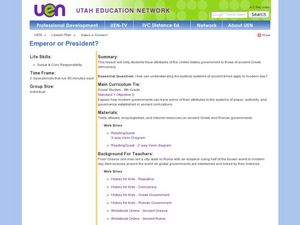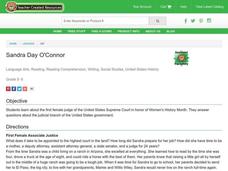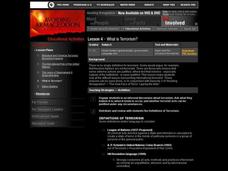Curated OER
Utah's Legislative Branch: How a Bill Becomes a Law
Seventh graders explain the steps by which a bill becomes a law. They research how a bill becomes a law within the three branches of Utah's government and synthesize their research and discussion in a classroom representation of government.
Curated OER
The Structure of British Columbia's Government
Eleventh graders play a "card game" centered around a "Jeopardy" type of task designed to review pertinent information on the subject of the three branches of B.C.'s government.
Curated OER
Who's Who in Government: Past, Present and Future
Twelfth graders research a list of governmental leaders of South Carolina's past and present. They briefly identify each by writing a short summary which includes the dates of their political career, party affiliation, positions held in...
Curated OER
The President's Role and Succession
Fourth graders examine the role the President of the United States plays in American government and the order of succession of cabinet members. They explain about presidential qualifications and the path to becoming President.
Curated OER
Emperor or President?
Sixth graders complete a Venn Diagram. In this government comparison lesson plan, 6th graders discuss how rules are similar and different at home, school and in their community. Students learn about the type and structure of the United...
Curated OER
Science Under Control
Pupils investigate and assess scientific issues for which government regulation has been or might be enacted. Using their research, students write letters to lawmakers supporting or contesting related legislative efforts.
Curated OER
Successful Deaf Leaders in Government
Students create a "Who's Who" compilation of local, state, national and international leaders that advocate, introduce legislation, and lobby for the deaf. They use internet research to create a catalog of biographies and then conduct a...
Judicial Learning Center
The Constitution
Supreme Court justices debate the meaning of the US Constitution, but we expect teachers to explain it to scholars with far less training and experience. A daunting task for sure, but it's not insurmountable with resources that simplify...
Curated OER
The Federal Legislative Process
Students investigate the concept of the Federal Legislative Process. This is done through the use of research on approved class websites. The lesson gives the option of developing other resources for students to use for the teacher to...
Curated OER
Election Term BINGO Game
Students test their grasp of election vocabulary with a quick BINGO game! They create a glossary of election terms or an ABCs of Elections book and add new election-related terms as they encounter them.
Curated OER
Building a Class Government Through Elections
Young scholars participate in their own classroom election to fill multiple positions. Individually, they examine campaign speeches and write their own. Once the election occurs, they must fulfill their duties as outlined in their...
Curated OER
Sandra Day O'Connor
No unit on important women in history would be complete without a activity on Sandra Day O'Connor. After reading background information about the first female Supreme Court justice, middle schoolers engage in several activities...
Curated OER
Hate-Crimes and Punishment
Students research and write about the effectiveness of hate-crime legislation in the United States
Curated OER
Taking From the Giving Tree
Students explore the ways in which various American cities negotiate the protection of their "green infrastructure," gaining a broader understanding of proposed and enacted legislation as it relates to preserving and planting trees in...
Curated OER
Having the Last Word
Students discuss the influence of foreign languages in their everyday speech after reading an article from The New York Times on language legislation in Brazil. Students are divided into 4 groups in order to research languages spoken...
Ohio Center For Law-Related Education
Four Activities: Thurgood Marshall and the Nomination and Confirmation of Federal Judges
The process of nominating and confirming federal judges can sound like a lot of bureaucratic hoops, but a resource breaks down the steps of the Supreme Court nominations in a simpler manner. Learners participate in four activities that...
Judicial Learning Center
The Players in the Courtroom
Courtrooms are complicated. In addition to the many rules, there are a number of people whose jobs are not very clear to the casual courtroom observer. With the resource, individuals identify some of these roles and review more...
Judicial Learning Center
Article III and the Courts
What's the best way to make sense of the Constitution? A helpful lesson contains both the text of Article III and annotation of each of its sections, breaking it down into easy-to-understand parts. It also includes links to a glossary...
Curated OER
Avoiding Armageddon
PBS has written a series of lessons on avoiding Armageddon. This is lesson 4 of 5 and focuses on defining terrorism. Upper graders watch episode 3 of "Avoiding Armageddon - The New Face of Terror," read how terrorism is defined by the...
iCivics
Mini-Lesson: Congressional Committees
How exactly do both houses of Congress come to a formal decision on an issue? Scholars research the use of congressional committees as part of the legislative process. By using current events to analyze information, they see the role...
iCivics
Mini-Lesson: Midterm Elections
Find out the differences between presidential and midterm elections with an informative resource. Pupils discuss the importance of midterms to the presidency and how midterms affect the balance of government branches. They also fill out...
Heritage Foundation
Courts and Judges
If the Supreme Court is so supreme, why do all cases not just start there? High schoolers learn why every case does not start at the Supreme Court as well as the importance of hierarchy in the US judicial system in the 11th installment...
PBS
President Theodore Roosevelt: Foreign Policy Statesman or Bully?
Can a negative perception of a president's foreign policy harm his or her historical legacy? A project that winds the clock back to the date of Theodore Roosevelt's death puts students at the editorial desk of a fictional newspaper....
Heritage Foundation
Lawmaking and the Rule of the Law
How many constitutional clauses does it take to create a bill? High schoolers find out with several activities and selected clauses about the rule of law and the US Constitution. Various coinciding activities help to strengthen learning.

























